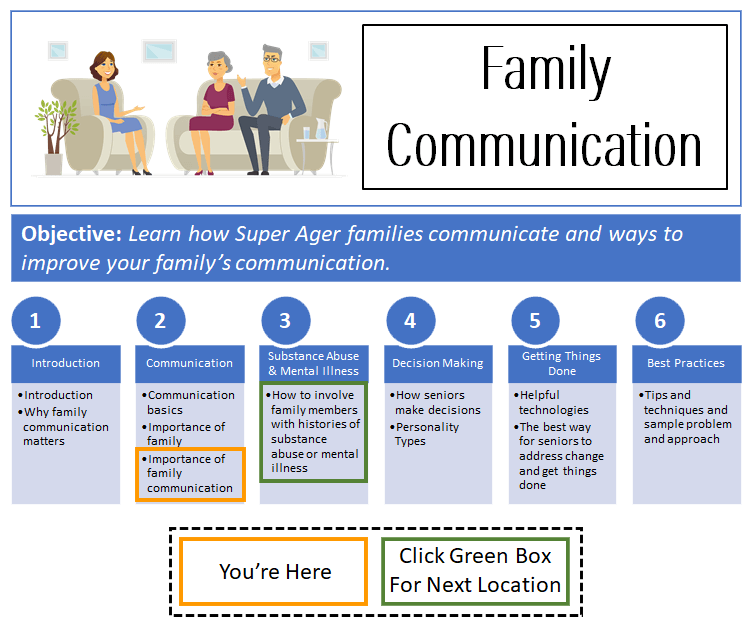Importance of Family Communication
Click here to see what's on this page.
Never underestimate the importance of family communication. An Italian friend once described his three-floor family home just outside of Milan to me. The Grandparents lived on the first floor, his parents on the second, and his older brother’s family on the third: three generations in one household. Years later, while Carmen and I were visiting Italy, we learned this kind of arrangement is common. It represents 10 – 15 percent of the Italian population, and close to 40 percent of Italians live in at least a two-generation household. It’s also common for generations of Italian families to live in the same neighborhood or nearby towns.

Good communication among family members allows difficult decisions to be made efficiently and increases the chances for better outcomes.
Carmen & Steve Glovsky – CarePlanIt
Multigenerational Households
A great way to understand the importance of family communication is to examine families living in the same household. These families know more about what takes place in that household than those that don’t. Also, as you get older and experience more, you see more of what takes place in the household. In other words, with more wisdom, you see more.
Communication among family members in multigenerational households works better because more family members share the same experiences and reality. If an Ager is becoming frail, it’s obvious to everyone in the household. When you don’t live in a household, or only visit the household once or twice a year for short periods, you know less. You’ve simply had less time to observe and share. Keep this in mind in reading this Section.
How does this effect a modern family? Think of a family game of hide and seek with the following rules. Hide anywhere in the house. The seekers can work together to find the hider. The winner is the hider who stays hidden the longest. If the seekers communicate well, they can optimize their search by dividing up and searching separate, and specific areas. If all the players run off and randomly search, they haven’t optimized their search. Optimized searches have better odds of reaching their objectives and reach them quicker than unoptimized searches.
The “Connector” In A Family
Researchers have shown that close families generally have a “connector.” The connector is usually a woman over 50 and serves as the glue that binds a family. The connector stays in touch with everyone and helps plan family gatherings. They’re most often described as loving, friendly and considerate. They are not described as organized, controlling, bossy or nosey.
Carmen and I think identifying the connector in your family can help you find the natural networker. But the connector may not be the best person to get things done. Connectors are generally good at connecting because they don’t get on people’s nerves. They don’t boss people around. Nore importantly, they aren’t controlling. Many of these characteristics are needed to address challenges during a crisis.
Calendaring & Communicating
Let’s quickly examine the big events in your life and how they are managed. Imagine your marriage, your child’s christening, or graduation from high school or college. Organizing and planning these events only requires a few family members. But they often involve ten, twenty, or even hundreds of family and community members. They are milestone events, not only defined by family but by culture and community. They may involve religious institutions like Churches and billion-dollar industries like education. Nuclear families and relatives’ calendar by these milestones.
Let’s look more closely at one of these milestone events: a wedding. Could you plan and execute a wedding on your own? Personally print and engrave the invitations, or program the online service to facilitate electronic invitations? Could you cook the food, bake the cake, and set the table? How about designing and sewing your dress? Don’t forget the honeymoon. Maybe you can envision designing and building your own transportation; a car, a plane, a boat. And of course, your own place to stay. A beautiful full-service hotel. Weddings require lots of help.
Planning For Any Significant Event
Large endeavors require lots of planning. We create, define and implement events like weddings by working and communicating with lots of people: family members, community members, and business owners. We determine what we want and what we can afford. Once we know what we want we need to determine where it will be and who’ll provide the services and products. All this planning usually involves our parents, siblings, and best friends. It’s a family affair and community activity.
Ask someone, anyone, what needs to be considered for a wedding and you’ll get a response that includes:
- venue
- menu
- dress
- cake
- invitation
- flowers
- honeymoon
- attendee list, and
- music
Ask the additional question “Who’s responsible for planning and making the wedding happen?”and you’ll get an almost universal response that includes:
- The couple, usually the bride
- The bride’s parents, mostly the mother
- The bride’s best friends
- The priest/religious institution where the ceremony is held
- A wedding planner (if used)
- Grandparents (they are often involved, especially when rings and dresses are passed down)
It’s often a family plan of sorts and there’s almost always family, friends and community communication.
Where’s The End-of-Life Planning?
Ask the same about end-of-life and you’ll get nothing close to this level of specificity.
Think about it for a moment. Name five key areas you’re responsible for at the end of your life? Take a moment. Write them down. If you’ve read through CarePlanIt, you know the answers. But that’s OK. Write down details of how you address the concern to test what you’ve learned!
Now look at what you wrote down and ask if you’ve accounted for a twenty-year period. A dramatic diminishment of wealth. Declinations in cognitive and physical capabilities. Did you accommodate the needs of your children or grandchildren? Needs for their college education, rehab or emergency medical needs? Either way, did you include a communication plan so they would know what to expect or not to expect in terms of your ability and willingness to help them in their time of need? Did you include how you might ask your children and grandchildren how they plan on helping you as you age?
Why Wedding Planning, But No End-of-Life Planning?
Wedding industry expenditures are $75 billion annually. The annual value of end-of-life services is over $2 trillion. How can every American know what’s in a wedding and how it’s likely to be planned, and almost no one knows what’s involved at the end of one’s life and how to make a great plan?
YOU’RE NORMAL. WE DON’T YET KNOW, AS A CULTURE, WHAT WE NEED TO DO AND HOW TO PLAN FOR IT. End-of-life challenges are our monsters under the bed.
Welcome to CarePlanIt. We help you slay those monsters.
We’re Poor Decision Optimizers
We generally are bad decision optimizers. Think of everyday decisions like:
- Where do we eat on Friday night?
- What movie do we go to see?
- When and how long do we visit your mother?
Most of us don’t have any agreed upon way to address these very simple and very common decisions. We wing it. If I’ve been working all day and am exhausted, I’m not going out to dinner on Friday night. If my wife has been waiting for a movie to come out for the last month, she doesn’t care what I want to see. That’s just pure will, winning at any cost. It often results in one of us not participating: one of us simply stays home. As for when and how long we visit mom, that’s just a mess.
Big Family Decisions Are Hard
Think of a few family decisions that involve high-stress issues like those below:
- Where do we live?
- Do we have enough money, or do we need a new job or career?
- How do we address a terminal illness?
- Our youngest child totaled the car, do we ground her from using the car for a year?
When More Than One Family Is Involved, They’re Even Harder
What happens if more than one family is involved with high-stress issues. Think of the following issues?
- Should we move in with Mom and Dad to care for them, or allow them to move in with us?
- As an Ager, should we tell the kids we’re out of money?
- As an Ager, should we tell the kids Dad has congestive heart failure?
- Should Mom have her car keys taken away?
The importance of family communication increases as the decisions get harder. When multiple families need to come together to address high-stress issues, communication is harder. Multiple families also mean more people are affected by the decision. Combine communication challenges and complex decision matrixes, getting to the best outcome gets complicated. Getting there calmly is even harder.
Hard Multi-Family Challenges
Below, Carmen and I present common family challenges that Agers and their families address during end of life experiences. The point of view can be from the ager, their children, or their caregivers. Most end of life decisions involve ager(s), children, family and caregivers.
- Treatment options during a hospitalization for a serious health condition
- Level of help needed to support an Ager (or Ager and spouse)
- Payment for help needed to support an Ager (or Ager and spouse)
- Trying to implement (i.e., have followed) a well planned Advance Medical Directive
- Trying to invalidate an AMD you believe was done improperly
- Ignoring the allegation of an existing AMD because your job requires you to get one signed for admissions
- Family commitment for a family member with serious dementia (e.g., Alzheimers, etc.)
- How other family members support a family members caregiving efforts (e.g., respite support, financial support, etc.)
- How to talk about aging issues with family members that you don’t get along with (i.e., have not communicated with at all, or well, etc.)
- You believe you understand your aging parent’s needs and other family members don’t
- You or other family members believe someone is taking advantage of an Aging family member (e.g., private caregiver, family member, institution, etc.)
- Visits or time spent with Ager(s) by family members
In the best of circumstances, most families have communication challenges.
A Metaphor
When’s the last time you went to your parents for Thanking and the entire family said, “We’re having so much fun, let’s extend this a week.” Families can often all get along for short periods when everyone knows there’s an easy exit. But during high-stress situations, most people lose the ability to remain calm. If you aggravate the stress with emotional issues, things only get harder. In other words, the importance of family communication in stressful situations is critical,
As the Ager, If I don’t have good family communication skills, it’s unlikely you’ll get good outcomes. Most of us don’t have great family communication skills.
YOU’RE NORMAL. WE DON’T YET KNOW AS A CULTURE WHAT WE NEED TO DO AND HOW TO PLAN FOR IT.
Welcome to CarePlanIt.
Other Resources On The Importance Of Family Communication
Make sure to see our other sections, especially, Getting Things Done here, and Best Practices: Tips and Techniques, here.
A good book on effective caregiver communication here.
